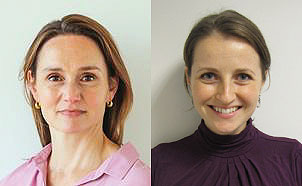Women's Health Research Program Names 2 New Scholars at UCSF
Two UCSF scholars have been appointed to a UCSF Bixby Center and Kaiser Division of Research program to develop new researchers focused on women’s health.

Corinne Rocca (left) and Catherine Koss
The National Institutes of Health-supported BIRCWH program, which stands for Building Interdisciplinary Research Careers in Women’s Health, named Corinne Rocca, PhD, MPH, and Catherine Koss, MD, as their new scholars. The program provides substantial career development support for translational and clinical researchers in a wide variety of disciplines addressing issues in women’s health.
Rocca is an epidemiologist focused on understanding the complex relationship between birth control use, accidental pregnancy and women’s attitudes about both topics. Earlier research has shown that some women have mixed feelings about pregnancy, concerns about the side effects of birth control, and mistrust of health care providers.
Rocca will explore how these beliefs are connected to young women’s use of birth control, risk of unplanned pregnancy and disparities in these outcomes. Her innovative methods include item response theory to construct improved psychometric measures of contraceptive and pregnancy attitudes. The ultimate outcome of her work will be improved reproductive health care policies and provider practices that will meet the needs of the United States’ diverse population of women.
Koss is a physician focused on clinical research to prevent and treat human immunodeficiency virus (HIV) among women, who account for nearly one in five new HIV infections in the United States. Koss will explore women’s use of pre-exposure prophylaxis (PrEP), a new HIV prevention approach that gives HIV-negative people anti-HIV medications, reducing their risk of becoming infected if exposed to the virus. The Centers for Disease Control and Prevention estimate that 468,000 U.S. women may benefit from PrEP, but this important prevention strategy is both underused and understudied among women. Although clinical and pharmacokinetic research has shown that PrEP prevents HIV acquisition, the level of adherence required to prevent HIV infection may be higher for women than men.
Using a mixed-methods approach and data from pharmacokinetic and open-label PrEP cohort studies, Koss will examine whether women and men use PrEP differently, and how consistently women and men need to use PrEP to get optimal pharmacologic levels of the medications. Her study will provide a first look at PrEP adherence among U.S. women, and new insights into sex differences in adherence and related factors. Ultimately, her work will help identify how women can use PrEP effectively and ways that health care providers can support them.
To learn more about the program and past scholars, on the BIRCWH website.
For more campus news and resources, visit Pulse of UCSF.